James Burton: From Elvis To New Zealand (Interview)
Guitarist James Burton has one of the most incredible CVs in music history. His work with Elvis Presley and Rick Nelson alone would be more than enough to land him in the Rock & Roll Hall Of Fame, but the “Master Of The Telecaster” has recorded with just about everyone over the past 60 years…Ray Charles, Frank Sinatra, The Byrds, Emmylou Harris, Neil Young, Brad Paisley, Jerry Lee Lewis, Elvis Costello…the list is endless. The 75-year-old legend will be making his way to New Zealand soon as part of Elvis Presley’s TCB band along with pianist Glen D. Hardin, bass player Norbert Putnam and drummer Ronny Tutt. These were the guys who backed Presley from 1969 until his death in 1977. The 13th Floor’s Marty Duda spoke to James Burton from his home in Louisiana recently and had plenty of questions about the hundreds of historic sessions he played on.
Click here to listen to the interview with James Burton:
Or read a transcription of the interview here:
JB: Rock and roll!
MD: Hey, hey, rock and roll! This must be Mr. Burton I assume.
JB: Yes sir.
MD: Hi, my name is Marty Duda. I’m in Auckland, New Zealand this morning, calling to talk to you I believe. Are you in Louisiana?
JB: I am in Louisiana, right here across from the Municipal Auditorium where Elvis played. I played there when I was 14.
MD: Fantastic. Was that part of the…
JB: Before Elvis did.
MD: Was that the Louisiana Hayride?
JB: Louisiana Hayride. Yeah, I was 14 years old, I played in the staff band. Floyd Cramer on piano, we had Jimmy Day, great steel guitar player.
MD: Amazing, that’s incredible. In preparation to talking to you I just pulled out an album and I figured you played on it, it’s Bright Lights & Country Music by Ricky Nelson and it has Louisiana Man on it.
JB: It’s true. Louisiana man Doug Kershaw.
MD: That’s right. Do you remember much about those sessions or do they all kind of blur together?
JB: Well we did so many but I do remember those. As a matter of fact I remember I called Clarence White to come and play rhythm guitar, we were just doing that good country stuff. Clarence White, I don’t know if that rings a bell.
MD: Clarence White? He played with The Byrds at one point I believe.
JB: Yeah, I got him a job with The Byrds. I played on The Byrds records and Clarence and I were good friends and we played, also played together on some of The Byrds stuff.
MD: Which Byrds tracks did you play on?
JB: Well I have no idea. Also, we lost a good buddy, Paul Revere.
MD: I wanted to ask you about Paul Revere because I’m a huge Paul Revere and The Raiders fan. I just did a feature on the radio about them.
JB: Yeah I played on their records and Paul came to my hometown, Shreveport, Louisiana and played at one of the casinos here.
MD: Right.
JB: And afterwards I came, I had a club downtown called James Burton, The Rock & Roll Café. So these guys, all of them, all of Revere Raiders came over and walked into my place and said man this is where we should
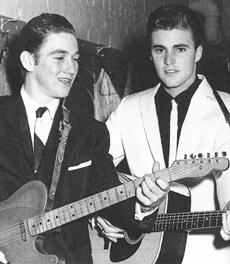
have played tonight. He loved it and I had them sihn my wall and everything.
MD: Fantastic.
JB: Yeah, we’re gonna miss him. He was a good one.
MD: Yeah, I mean, he was a true rock and roller, I mean, he’d been playing in that band since 1958. Yeah it’s incredible. When you played on the Paul Revere sessions, was it all session musicians or were there band members involved? Do you remember any of that?
JB: There were a lot of session musicians but also his band playing too. You know, a lot of groups like that they would go record but they would call studio players to come and play on the record.
MD: Right, yeah. I think with them, they started out playing themselves on the record and then as they got too busy touring and doing TV shows they had the session guys coming in and doing the recordings for them, if I’m not mistaken.
JB: Like The Ventures yeah. I played on the Ventures records when they were on tour. We were in the studio cutting the records while they were on tour. They had to come back and learn their songs.
MD: So, yeah. I’m hoping, I know you’re coming here the TBC Band to do a little tour and you’re touring with a New Zealand musician, a singer by the name of John Rowles. Are you at all familiar with him?
JB: Well, I remember he came and performed in Vegas one, we were there with Elvis performing, it was around the same time.
MD: Yeah.
JB: I put the band together for Elvis in 1969 and I worked with him until he passed away in 1977 and I never met John personally but I’m looking forward to it. Everybody I’ve talked to has nothing but great stuff to say about him.
MD: Right, right. Have you played in New Zealand before?
JB: Oh yeah. We actually came and performed the Elvis big screen show there.
MD: Right.
JB: And I believe I’ve been there with other artists. Possibly, it could either be Jerry Lee Lewis, it could be Elvis Costello, it could be Emmylou Harris.
MD: Right. Amazing, I’d like to kind of talk to you a little bit about vocalists. I know you’re a guitar player but you’ve played with so many amazing singers, you know, Elvis and Emmylou and John Denver and Glen Campbell, is there anything, any insight that you can provide on how a vocal, what makes a vocalist great and how, maybe, what makes Elvis, Elvis as opposed to John Denver, John Denver, you know, from your point of view.
JB: Well, that’s pretty hard, that’s like my car’s faster than your car.
MD: Right.
JB: I don’t know. You know, I got to tell you, Elvis did have an unusual voice. I got to tell you, just a natural, natural incredible entertainer, singer. The good Lord blessed him with a wonderful voice and just all around incredible natural talent. I think that what makes a real good singer is being very natural and of course you have to have your own identity, your own style, do your own thing. You know, but everybody has a different voice, everybody projects in a different way. Like you have Frank Sinatra, you have a lot of look-a-likes and sound-a-likes.
MD: Yeah.
JB: But there’s only one of each person, you know, like there’s only one Frank Sinatra. There’s a Frank Sinatra junior.
MD: Right.
JB: But there’s only one senior. Well basically that’s the way I feel about a singer is natural, being a very natural singer is not trying to copy anyone, just do your thing and being very soulful from the heart, you know, basically it’s from the heart, you know.
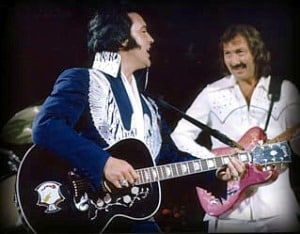
MD: Right, right. And how much of the singer’s vocal style affects you’re playing, when you’re playing with them?
JB: Well the better they sing, the harder the lick. I like to key off of vocals like when a guy sings a wonderful line on a song I’d like to answer that with a very complimentary guitar feel.
MD: Right.
JB: You know.
MD: Yeah. Getting back to guitar playing. When you were starting out in the 50s, rock and roll was kind of in its infancy, did you feel like you were a part of a group of guitar players that were kind of craving out what rock and roll was? I mean, there was like you and Paul Burlison and Scotty Moore and Chuck Berry and Dick Dale, Link Wray, Duane Eddy. Was there kind of communication between you guys, did you all listen to each other?
JB: Well when I started out I was into country music and learned a lot by listening to radio, playing records. My heroes were like Chet Atkins, Merle Travis, Les Paul, there was a guy that played with Ernest Tubb named Billy Byrd, he was a very god guitar player but that was pretty much my heroes and I got into rhythm and blues. I grew up on country but got in to rhythm and blues right away and guys like Elmore James and of course Chuck Berry, Bo Diddley, Lightnin’ Hopkins, John Lee Hooker and Howlin’ Wolf. You know, I played with him on Shindig in 1964 when The Rolling Stones came and Keith Richards said yeah we wanna come do the show but we wanna bring somebody with us and that was Howlin’ Wolf. So JB Got to play with Howlin’ Wolf!
MD: Amazing, amazing. I’m kind of interested in…you know, Shindig is one of those iconic American music shows, what was it like being on the show? What was kind of going on in the background as far as…?
JB: Everything.
MD: Everything.
JB: Everything. The producer Jack Good from England. Johnny Cash called me to do a TV show and this was basically when I had made my exit from Ricky because I wanted to do the show but Ricky didn’t want me to do it but, anyway. I went and did the show and it was Shindig and Jack Good was a big fan, I mean, he loved the records I played on with Ricky, Hello Mary Lou, Travellin’ Man, all those big hits.
MD: Right.
JB: And Jack said, ‘oh my God, you got to be on the show every week’, so I said, well what do we do Jack? He said well put a band together and that’s when we formed a band called The Shindogs and that was with, Delaney Bramlett was a great singer. I’m sure you remember Delaney and Bonnie.
MD: Sure.
JB: And Delaney was the bass player and singer, the other singer was Joey Cooper, played rhythm guitar, Chuck Blackwell on drums and Glen Hardin who is coming over with us with the TCB Band.
MD: Right.
JB: He was there and I played guitar. So we were the Shindogs and the show was just a killer show, you know, I played behind Jerry Lee Lewis, all those wonderful great entertainers came and performed.
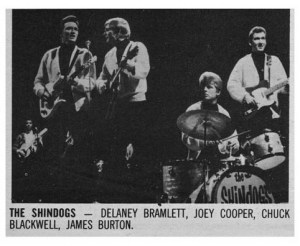
MD: Right, right. I mean, it must have been amazing. Other than Howlin’ Wolf, is there anything else that really stands out as kind of bizarre or incredible or just, you know, memorable?
JB: Bobby Sherman, Glen Campbell, Jerry Lee Lewis, everybody was on the show, Cher, Sonny and Cher my God, everybody was on the show. Everybody you can think of, you know, Tina Turner.
MD: That’s amazing.
JB: Everybody, my God. I did a country album with Tina Turner, it was fantastic.
MD: And of course, you know, your work with Elvis which kind of started in the late 60s and, you know, Scotty Moore recorded with him in the 50s. Have you and Scotty compared notes about, you know, have you ever gotten…?
JB: Oh yeah, Scotty and I are good friends yeah. I knew Scotty and them way before I met Elvis. I didn’t actually meet Elvis in person because I went to work with Ricky Nelson when I was 16.
MD: Right.
JB: And I’ve worked with Ricky until 1964 when we did the TV show Shindig. Then I went into doing studio, I was doing studio work with everybody, all the artists and when Elvis called me in 68 to do the Ccomeback Special, I was not available, I was doing an album with Frank Sinatra with the producer Jimmy Bowen. So I didn’t get to do that Comeback Special but Elvis called me in 69 and asked me to put the band together but, I mean, just a lot of history from way back.
MD: Yeah, yeah and what were those years like in Vegas? I mean other than, what did you do other than play on stage?
JB: Well, I bought a house there and I didn’t like staying in hotels that much because it was so noisy, a lot of people banging and calling your room all the time. So I got a, I bought a house and I stayed out, and of course I have a lot of friends in Vegas and even when I go to Vegas not performing, I just go visit my friends.
MD: Right. Is it a very musical town or is it all kind of revolved around gambling and showgirls and things like that?
JB: It’s a little bit of all of that.
MD: All of that.
JB: Just a little bit of all that stuff and, but it’s pretty interesting.
MD: Maybe I can just throw out some names of some folks that I think you played with and you can give me your impressions of them. Maybe start out with like Johnny Rivers.
JB: Johnny Rivers, I brought him to California. He wrote a couple songs when I was with Ricky and he wanted to, wanted me to present the songs to Ricky and I did, Ricky did like some of the songs. So actually he recorded 2 or 3 of Johnny’s songs and I called Johnny and told him we were in studio recording songs and he flipped out and he said oh man can I come out to the studio. So he came out from Louisiana and in his book, I don’t know if you read his book but he gave me all the information about the, you know, about the getting him to California and jumpstarting his career.
MD: Right, right. Okay. Harry Nilsson.
JB: Harry Nilsson, Everybody’s Talkin’.
MD: Yeah.
JB: Yeah I played on a bunch of his records. He was a great singer, a good songwriter and I mean a good friend of mine Rick Jarrard at RCA recorded that song.
MD: That’s right, yeah. He also produced the Jefferson Airplane I think.
JB: Who?
MD: Rick Jarrard, I think he produced Jefferson Airplane.
JB: Very possible, yeah. I know we did Feliciano, Jose Feliciano.
MD: What about Neil Young. I think you worked with him a bit.
JB: I probably did with, what is that record, Claim to Fame? Richie Furay and…
MD: Oh with Buffalo Springfield, yeah.
JB: Buffalo Springfield, yeah and later on Poco and all those, I played with all of them.
MD: What did you think about country rock when it was happening in the late 60s, early 70s? Was that something that you could relate to?
JB: Well, it could be, yeah. I like all kinds of music. They kinda credit me for being one of the pioneers of one of the very first rocker, rock and roller, you know. They used to call it, what is it, rockabilly.
MD: Yeah.
JB: and we put heavy drums on it and became the rock and roll king. No just a, you know, it’s just kind of a great mixture of music is good for you, I think it’s really good.
MD: Alright. Are there any up and coming guitar players, newer guys that you listen to and are impressed with these days?
JB: Well I work with so many different guitar players, you know, I look at all these young guys and I said my God that could have been me 60 years ago. I think it’s interesting, you know, everybody’s got a little different twist on how they want to tune up and jump out there on stage, you know, some people can’t stand still.
MD: Right.
JB: You know, my old buddy Keith Urban, you know, he’s one of those guys, he’s all over the stage.
MD: Right.
JB: Him and Brad, Brad Paisley. We all, we’re like a big family, we’re all good friends and family.
MD: And what’s the scene like in Nashville now compared to what it was in the 60s?
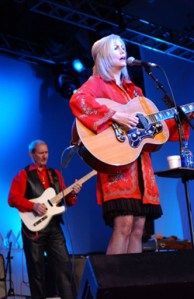
JB: I think it slowed down a little bit. Every place, you know, is not as much recording, it’s not as much stuff going on today. There’s a lot of great bands are still touring. A lot of recording studios have shut down because it’s not as busy as it used to be but there’s a lot of activity going on and I think Nashville is one of the, probably the most jumping places you know next to, you know, with the L.A
MD: Right.
JB: And I’m sure a lot of stuff going on in New York. I had the pleasure to play with Toots Thieleman. He was great, harmonica player, jazz guy.
MD: And is there, do you have a most memorable session that you played on? That is really special to you?
JB: Yeah, there’s just too many of those to talk about. I enjoyed playing on Nat King Cole’s records and Ray Charles. You know, people like Merle Haggard, incredible artist, Brad Paisley, played on couple of Grammy winning record songs what did with him. There’s so many, Emmylou Harris, you name it.
MD: That’s amazing, man.
JB: And the list goes on and on, George Harrison, my God , hey, how about Henry Mancini.
MD: Right.
JB: Buddy Emmons did an album with Henry Mancini.
MD: And going back to Elvis. What would you say is the most misunderstood thing about Elvis? Do people have a clear idea of who, what kind of man he was from what’s out there in the press and things, I mean, you’ve worked with him for years and years, so you must have got to know him fairly well.
JB: Well, I got to tell ya. Most people know Elvis, most of them, the fans around the world, 5 billion fans can’t be, they all can’t be wrong.
MD: Right.
JB: Elvis, Elvis was a great singer, a great entertainer, he had great looks, he did lots of movies, did lots of records, did a lot of travel. I mean, he’s just an amazing entertainer, artist and there’s a lot of great guys, I played on Tom Jones records, him and Elvis were very close friends and, they’re all just great, you know,
MD: Yeah.
JB: Just being such a good natural entertainer, you know.
MD: Yeah. Just trying to get a feel of what kind of guy he was other than what he was on stage.
JB: Elvis was just a great guy, he was a great Christian boy, he was very generous. We were family and he was just a great guy to be around, he was funny, he was serious, you know, we go in the studio to record and he would, you know, he would talk and kid around with everybody and you know, everybody kind of joke around a little bit and then when he got serious to work, everybody got serious because he was ready to work and everybody knew it. But he could be funny, he could make you laugh, he could, just incredible person. But he loved his family, he was just a down home Christian boy and just a real natural person.
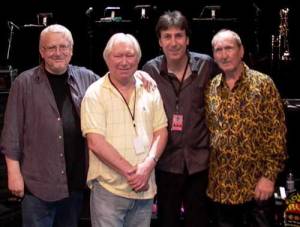
MD: One last person I want to talk about is a guy who’s kinda been in the news because he’s kinda getting unwell these days is Glen Campbell and I know you worked quite a bit with him in his early days of his career. What can you tell me…?
JB: Yeah I met Glen when he first came out to California. I was out there working with Ricky and I was playing with a guy named ???. I met Glen when he first came to town and Ricky didn’t want me to play on record so I recommended Glen for a lot of records and Glen and I also worked together in the studio. I played on Glen Campbell’s first album Kentucky Means Paradise, I played on Gentle on My Mind, just a whole bunch of records with Glen and we were just the best of friends and through all the years of music and worked together. I was on his T.V show quite a bit, Good Time, Glen Campbell’s Good Time Hour, you know, with Jerry Reed.
MD: Oh yes I remember it well.
JB: All of us, you know, we’re all like family and it’s just devastating that Glen is very ill now, it’s very sad.
MD: Yeah. It’s tough to see that when you, cause you, even for myself being a fan, you know, you feel you know these people because you’ve been listening to them for such a long time, you know.
JB: Yeah. It’s just a sad thing, you know, when Elvis passed away it was very sad, you know, it’s just, you know, these are people we think about all the time, you know, and almost every day.
MD: Yeah. Well it’s good to see that you’re still rockin’ and you’ve got Glen D. Hardin and Norbert Putnam and Ronny Tutt playing with you. I mean you guys have been playing together for years and years so there must be a certain kind of magic that happens when you guys get on stage together. How would you describe it?
JB: Yeah, it’s magic and it’s together again.
MD: Right.
JB: Remember that song, Buck Owens Together Again.
MD: Right.
JB: I believe it was Emmylou Harris that recorded it and I played on her version too.
MD: I would imagine it would be hard to find a record that you didn’t play on. It’s incredible. Alright, well thank you very much for taking time to talk to me, I appreciate it. I can’t wait to see you when you get down here.
JB: I’m excited and give my love to everybody and in a few weeks we’ve be there, few days matter of fact.
Click here for more information about the New Zealand TCB Tour with John Rowles.
- Civil War – Dir: Alex Garland (Film Review) - April 9, 2024
- Pearl Jam – Dark Matter (Monkeywrench/Republic) Album Review - April 1, 2024
- Blonde Redhead – New Zealand Tour 2024 - March 14, 2024
